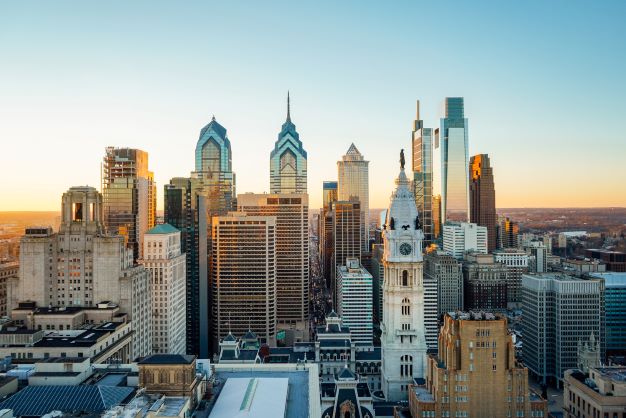With $126 billion GDP per year, the Philadelphia metropolitan area, the city of the Declaration of Independence, is an economic powerhouse in the country with the world's largest carbon footprint. So, to understand how to shake up inertia in one of the kingdoms of the linear economy, Renewable Matter interviewed Nic Esposito, co-founder of Circular Philadelphia, an initiative born in 2021 that already counts among its members more than 70 individuals and 30 organizations. What will be the recipe for change on the other side of the Atlantic?

Nic, before speaking of Circular Philadelphia, you used to work for the local government. What were you in charge of?
Four years ago, I was the Zero Waste and Litter director for the City of Philadelphia. We were already in the C40 Cities Climate Leadership Group, but when the Kenney administration started, which is the current mayoral administration, they really wanted to make the zero-waste goal a reality. There was a huge litter problem in the streets. We were like the Rome of the United States without all the cool artifacts and art from the Roman Empire. So, we said how do we make an initiative that gets that long term goal of zero waste but makes like immediate impact right away? We started to implement this idea of the social contract. As government, we tried do set the right playing field for residents and businesses and make things better. I spent three and a half years doing it and we had major successes, one of which just came to fruition and gives you an example on our long-term strategy. Composting is best done locally, right? But the state of Pennsylvania at that time did not grant a permit to allow you to do composting in a city. We set up a whole kind of observation project, an initiative with a local composting company to take over a park site to compost on as the demonstration for the future permit. Yesterday, they finally got that permit.
What happened next?
Sadly enough part of the story is the Kenney administration during the pandemic was making some bad decisions and very short-term decisions, like cancelling the Zero Waste and Litter Cabinet. So, I ended up leaving city government in June 2020. I could have stayed on, but I was ready to get out. I wanted to figure out how to make change in the private sector. So, a big part of why I brought up the C40 Cities Climate Leadership Group was that their assistance coupled with our local expertise did a lot to help our government set the zero-waste goal: that means shutting down incinerators, shutting down landfills, that are really a big issue here. During my mandate I was working with groups like C40 that were doing more sustainable waste management. There was this one group I was on called The Waste2Resources Network, with 25 cities that were all connected on waste management goals and targets for our individual cities. And one of our study tours took us to Milan. We went to AMSA and saw the composting operations at the large outdoor market and saw their resident drop off centers. We also visited CONAI, then we went to Rotterdam as well. So, I was connected into this world, and I was really being exposed to the circular economy. I was working with the economist Kate Raworth, that wrote Doughnut Economics. When I got out of city government, an old colleague of mine, Samantha Wittchen, contacted me and she was enthusiastic about how much progress the city made. She told me: “This initiative was so important, and the circular economy needs to happen in Philadelphia. This cannot die. We must keep this going. Let's start a non-profit”. And that is how Circular Philadelphia was started.
What does Circular Philadelphia do?
Primarily our mission is to bring together individuals, the consumers, the people that want to see this happen with businesses, government partners, institutional partners like hospital systems, universities, academia, all together to drive the circular economy in Philadelphia. We want to take a 30,000 foot view, the large perspective of what is circularity. But we also like to take a very tactical approach.
First, we have defined certain sectors where we think we can make major impact, and that's in food systems, the built environment, and textiles. Over time, listening to our members, we've also added a fourth initiative in our focus area which is vacant lots. We are a major industrial city, up until the seventies, all that went overseas. I mean, we lost more manufacturing jobs than the entire population of Pittsburgh, and that has led to 40,000 vacant lots, which is crazy. We asked ourselves, how do we take this vacancy? How do we really rebuild Philadelphia in a circular way?
And what is your strategy?
For all our initiative our theory of change is you start with the policies that either need to exist or policies that are holding things back. And then once those policies are changed, level the playing field, circular businesses can compete with conventional businesses that are already being subsidized. Only at that point, we go to education and outreach, how to make enough people know that these policy changes are going to benefit them and how they can tap into it. Once you have enough people knowing about it, then we start getting into market transformation. Because that’s the third part of the arc, right? How do we make it TIP?
You have recently released the first annual report. What kinds of activities have you focused on?
During the pandemic, everyone tried to support his favourite restaurant, since we could not eat indoors. So we got takeout, getting all of this packaging, like all these individual plastic containers and disposable. This one restaurant group, that is now a Circular Philadelphia Member, called Tiffin Indian Food created a reusable container system for their restaurant in March of 2021. They were very successful. They scaled from a thousand containers in the beginning of the month to 8000 by the end of the month in circulation. That's how much people wanted to do that. At the end of this, the first month that they did it, our Health Department walked in and shut them down. There was a weird old law that said you couldn't use reusables. So we worked with the Health Department, and we changed the policy. Now you are allowed to use reusable containers, and not only is it better for the environment. It's a huge cost saver. One reusable container you can use 1000 times cost $5. That same amount of disposables costs about $250.
What about construction?
We're trying to do a construction and demolition recycling ordinance. And again, the more complicated the law is, the more you have to make these things simple. If you build a house in Philadelphia, you already have to list who your waste hauler is on the job. No one was ever doing that, so we never knew how waste was leaving a site. We collected research for the Philadelphia legislator. There are five places in Philadelphia where they recycle construction or demolition, which is a lot to be a single city.
We are trying to get a new law passed: owners will take the waste to one of those places, get receipts and show that you did at the end of the job. At the end, when you have built your building, to get your certificate of occupancy, you normally have electric or plumping inspections. This would just be another inspection to say, did you take your waste to these places? If you didn't, you're not getting your certificate unless paying a penalty.
And how do you encourage a sense of community?
We did this initiative called the "Circular Scavenger Hunt". We were asking people to go through their neighborhood and identify and equitably acknowledge the legacy businesses in Philadelphia that have been employing circular techniques for years – repair shops, second hand shops and refillable good stores. Circular Philadelphia is collecting information on those businesses through its network and highlighting their efforts. Our city is a very low-income city. On the other hand, a lot of invention comes from not having a lot of money. In Philadelphia we have a lot of people that already use thrift stores and that already repair their stove instead of buying a new one. We need to recognize those people and say “You are part of the circular economy, join us. Be a part of us, no matter if you are rich, poor, young, old, black, white, educated or not.”
You know the world and the world of the circular economy. In terms of investment, what should be done in the US?
A lot of people got down on Joe Biden for being so old, but Joe Biden is old enough to remember what really made our country move forward was public investment into the private sector. I think of solar panels, the Internet and other things that came from innovation from our Navy. It’s a feat to basically make a city float at sea so you needed all of those things that are now being used to progress sustainability. What we need to do is take that money and then invest it into the private sector to figure out how to get it out there. I think America has been good at that.
A kind of New Deal, as during the Great Depression? Is this a model that can still work?
Exactly. The Inflation Reduction Act, with its $ 500 billion, is probably the biggest piece of legislation the world's ever seen in climate. The biggest parts of that are investment and money being made available into the private sector. Now, hopefully we will get it even more right and learn from the Europeans – but the same applies to China and countries like Japan - to have tight regulation. We must stop looking at just the short-term profit, changing Reagan’s economic “doctrine” of trickle down and supply-side economics. I'm really excited about what we can accomplish here in the United States from the federal level.
And from the federal level up? I mean, billions of people look at what's going on in your country.
Applying circular economy in this area is really interesting because you have New York, New Jersey and Pennsylvania, which taken as those three states is a major part of the US economy Then you have California, which alone is the sixth largest economy in the world. And we now, when California passes a law, it starts to it really ripples throughout the country at least, and then throughout the world.
A lot of people, especially in US, like Donald Trump, they are anti-globalization and anti-internationalism...
While there is a lot of things that are problems with globalization - like I said about Philadelphia losing all those jobs in the 70s - there are really some good things about it. For example, interdependence really stops you from going to war. Sometimes I believe we must scale things up and put more efforts in developing at least regional circular economies. For example, it can't be that much different going from New Jersey to Pennsylvania, just like it can't be that much different going from Ukraine to Poland or Italy to France. I think circular economy creates that cooperation because you're relying on these circles. And the circles can be small on the local level, and the circles can be big on the international level. But the trick is getting them all to connect.
Image: Skyline from Loews December Sunset (K. Huff for PHLCVB)



